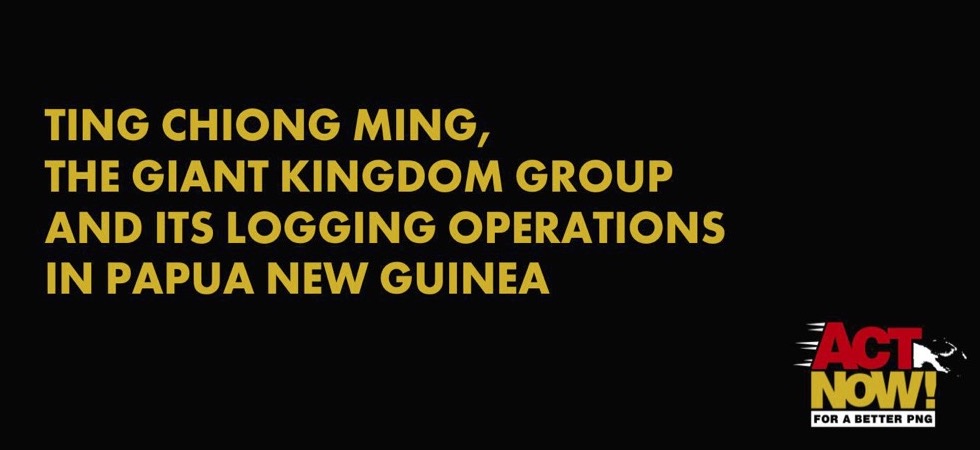
The Malaysian owned Giant Kingdom group of companies, which is logging Papua New Guinea’s besieged tropical forests, has failed in an unprecedented bid to silence public comment on the money laundering risks associated with its chequered activities.
At a time when international standard setting bodies are calling on civil society to help combat the money laundering risks associated with illegal logging, the Giant Kingdom group has engaged in lawfare to stop civic voices in PNG from documenting these risks.
This ‘SLAPP’ style litigation followed the publication of a report by ACT NOW, titled ‘Ting Chiong Ming, the Giant Kingdom Group and its Logging Operations in Papua New Guinea’, in November 2023.
Copies of the report were distributed by ACT NOW to banking regulators in PNG and Malaysia and to financial institutions identified as possibly lending to the Giant Kingdom group.
Giant Kingdom group and its principal, Ting Chiong Ming, were contacted for comment on the findings in the report prior to its publication, but did not respond.
The Act Now report targeted by Giant Kingdom group highlights evidence from sources including the National and Supreme Court and a Commission of Inquiry that raise concerns over the legality of the group’s logging operations and associated land acquisitions by its companies
In February 2024, Giant Kingdom group company Global Elite Limited and its principal, Ting Chiong Ming, issued legal proceedings against ACT NOW, and a British Professor who assisted with the study.
The summons alleged neither party was authorized under PNG anti-money laundering legislation to publicly raise money laundering concerns or report these concerns to financial institutions. Injunctions were sought which would have stopped ACT NOW from making public or private comment relating to the Giant Kingdom group and the money laundering risks associated with its PNG forestry operations.
These types of legal action are commonly called Strategic Litigation Against Public Participation or SLAPPs, because of their illegitimate impacts on free speech and democracy.
However, following a National Court ruling that rejected an application for injunctions against the NGO and facing an application from ACT NOW to have the entire legal proceedings thrown out, the logging company has now withdrawn its lawsuit and agreed to pay ACT NOW’s legal costs.
The legal action was an attempt to frighten and intimidate the NGO and stop its advocacy for action on forest crime.
SLAPP lawsuits are a common tactic used by corporations to try and silence legitimate criticism of their environmental and human rights records. They are an abuse of the legal process and to see their emergence in PNG is a worrying development.
Some countries, like the UK and Canada, have already moved to ban SLAPP lawsuits and they can result in misconduct proceedings against the lawyers involved.
Illegal logging and forest crime has been recognised as a huge problem in Papua New Guinea by institutions like the Bank of Papua New Guinea and the Internal Revenue Commission as well as international bodies like INTERPOL and the UN Office on Drugs and Crime.
ACT NOW says it is not going to be intimidated by legal threats and the recent lawsuit only goes to show the effectiveness of the growing scrutiny from regulators and law enforcement agencies on the activities of the logging industry.
The British Professor targeted by Giant Kingdom group, Kristian Lasslett, a criminologist at Ulster University states “a Malaysian logger has attempted to use Papua New Guinean courts to silence an academic in the United Kingdom, for the simple act of providing research support to a local community group tackling abusive forestry actors.
“This is a worrying sign of how foreign owned companies will use their significant financial clout to whittle down the community’s resolve to defend its constitutionally protected natural resources in PNG, using the services of willing law firms”.
